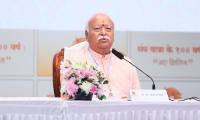Eleven thousand junior doctors in Andhra Pradesh called off their six-day-old strike on Thursday evening after giving an undertaking before the state high court.
A division bench recorded the statement of AP Junior Doctors Association president B R Suresh Babu that they would file a writ petition listing out their grievances against the government and that they would not go on strike, even if the relief sought by them is not granted by the court after the hearing.
The high court directed the state government not to take any (punitive) action against the junior doctors and even if some action had been initiated, further proceedings be kept in abeyance.
The court said junior doctors should report to duty latest by Friday morning and that the government could bring it to its notice if any junior doctors failed to turn up.
This is the second time that the junior doctors in the state have resorted to a strike and called it off on the intervention of the high court. Earlier, they went on an indefinite strike on June 23 and called it off on the eighth day, after giving an undertaking in the high court.
They launched the strike again from July 9, claiming the government had remained adamant and failed to respond to the court directive to look into their major grievances.
The government invoked the Essential Services Maintenance Act against them since they boycotted medical services, including emergency care, in all the teaching hospitals.
The government also decided to recruit 1,000 doctors on an ad hoc basis immediately. Apart from a Public Interest Litigation filed by Dr C L Venkata Rao, honorary secretary of Indian Medical Association, AP chapter, the government also moved a contempt petition against the junior doctors' association.
Hundreds of junior doctors were arrested as they resorted to a 'jail bharo' programme.
The division bench, comprising acting Chief Justice Bilal Nazki and Justice G Chandraiah took a serious view as the junior doctors had gone back on the undertaking given to the court.
The core demands of junior doctors include a ceiling on the number of medical colleges in the state, revocation of essentiality certificates granted to 15 private medical colleges by the previous Telugu Desam regime, cancellation of government orders issued by the present government to allow more private colleges, implementation of residential system in all teaching hospitals, recognition for unrecognised postgraduate seats, reconstitution of the committee headed by former Nizam's Institute of Medical Sciences director Dr Kakarla Subba Rao to monitor the functioning of private medical colleges and release of funds by government in lieu of user charges.
The government claimed that it had agreed to most of the 18 demands raised by the junior doctors, but the latter had no right to raise policy issues.








